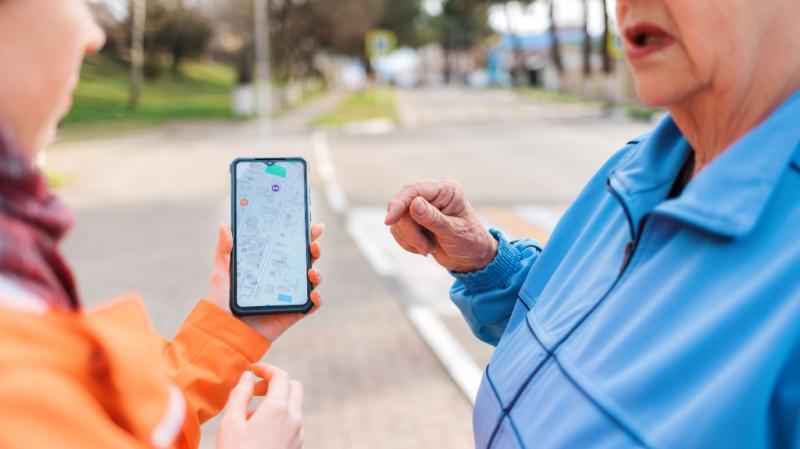How Tech Can Help Seniors With Dementia And Alzheimer's Disease

So far, no cure for dementia and Alzheimer's disease has been found. As expected, living with dementia or Alzheimer's or caring for a loved one with either disease can sometimes be overwhelming.
Individuals with dementia or Alzheimer's experience memory issues, trouble communicating, mobility issues, and bladder incontinence. Similarly, caregivers have to contend with fulfilling housekeeping tasks, such as providing physical, medical, and nutritional care, social interaction, and cooking for them. This can be a heavy burden, especially when the patient you’re caring for is a loved one.
Numerous technological innovations have been designed to ease life for seniors, their families, and caregivers. Today, caregivers have access to dementia training videos that help the upskill to offer a more personalized positive approach to care.
Tech has also been very resourceful with the victims of dementia and Alzheimer's disease and this article looks at how. Keep reading to find out more.
Ways Tech Aids Seniors With Alzheimer’s Disease And Dementia
Below are some of the ways tech tools can help seniors with dementia and Alzheimer’s disease while lifting the burden of their caregivers.
1. Tech Aids with Their Memory
Memory problems are among the symptoms of dementia and Alzheimer’s disease. An individual living with either disease may have difficulty recognizing friends or family, remembering important details, or even recognizing their surroundings.
The consequences of losing one’s memory are a lack of independence and low self-esteem. Fortunately, various technological tools exist to help seniors cope with the declining brain function resulting from these illnesses. Some of these tools include:
- Automatic Calendars
An automatic calendar is another technology that can help with memory problems. Seniors living with dementia or Alzheimer’s may have difficulty remembering dates or times. This makes them likely to miss appointments if they have no one to remind them.
However, an automatic calendar reminds them of the correct time, day, and date. This helps minimize the confusion that accompanies memory loss. In addition, some automatic calendars can be programmed to show important messages throughout the day. For example, reminders with messages like "drink water" or "take your pills" can significantly improve the lives of seniors with dementia or Alzheimer’s.
- Virtual Assistant Devices
Virtual assistant devices are equipped with a loudspeaker and a microphone and can record and reply to voice commands. Examples of virtual assistant devices are Alexa and Google Home. Individuals living with dementia or Alzheimer’s disease can use virtual assistant tools to set reminders for important tasks. These activities may include remembering a doctor’s appointment, turning off the oven, or calling a loved one.
Virtual assistant tools can also carry out simple tasks when connected to other home electronic devices. These tasks include adjusting a room’s temperature, switching lights on or off, or turning the television on or off.
- Mobile Phones
Mobile phones are also vital tech devices that can help with memory. The mobile phones available today have various features that can be used to set important reminders. For example, some phones have customizable alarm clocks that allow one to program messages alongside the alarm. Therefore, seniors or their caregivers can set alarms for various activities like taking pills or going to bed. Then, when the alarm goes off, the message that serves as a reminder is displayed on the screen.
Most mobile phones also have a calendar or notes app that serves the same purpose. The only difference is that the alarm clock doesn’t go off when the message is displayed.

2. Tech Enables Them To Stay Connected With Their Loved Ones
Social interaction is vital to seniors with Alzheimer's and dementia. This is because it helps minimize depression and feelings of loneliness that come with growing old. Fortunately, various tech tools exist to ensure that seniors living with these conditions remain connected with their loved ones. They include:
- Video Call Technology
Video calls are a convenient way to stay connected with loved ones, especially for seniors with dementia and Alzheimer's. This is because seeing the other person makes it easy to recognize them. Nonetheless, it's common for seniors with dementia or Alzheimer’s to forget how to answer a video call. Thankfully, some devices have video call features that are quite advanced.
An example is the "drop-in" feature that can be set up on devices like the Amazon Echo Show. This feature allows the device to answer a call without any action from the owner.
- Specialty Phones
Like Alzheimer’s and dementia, sight and hearing problems arise with age. As such, some seniors with dementia or Alzheimer's may experience problems with their hearing or vision. This makes using the usual mobile phones difficult and may consequently strain their ability to stay connected with loved ones.
An alternative to using mobile phones is using specialty phones. These phones have features designed to suit the needs of patients with hearing or visual challenges. These features enable them to stay connected with loved ones.
An example of a specialty phone is the RAZ Memory Cell Phone. Some specialty phones, such as this one, include pictures of each contact alongside their names. This ensures that the user knows whom they’re calling before they make the call, thus minimizing confusion. Specialty phones also have good battery life and signal strength, which makes them reliable.
Amplified phones are also specialty phones designed for individuals with hearing loss. One of the benefits they may provide to seniors with dementia or Alzheimer’s is not missing important phone calls. This is especially the case if the relevant senior has problems with their hearing. Additionally, amplified phones streamline communication as their speakers make it easy for users to hear others on the call. Further, most amplified phones come with a caller ID, which makes identifying a caller easy.
3. Tech Enhances Their Safety
Memory loss and concentration difficulties can put the life of a senior with dementia or Alzheimer’s at risk. For instance, they may wander into the neighborhood and forget the way back home. They could also decide to cook and forget to turn off the stove after they’re done. However, many technological tools are available today to enhance their safety at home and outside.
- GPS Tracking Tools
Various GPS tracking tools in the market today help keep seniors with dementia and Alzheimer’s safe. For instance, GPS shoe insoles monitor the location of the person wearing the shoe. This gives caregivers and family members peace of mind and alerts them in case of a problem.
Smartphones can also keep track of seniors prone to wandering. One only needs to turn on location sharing on the individual’s device to make their location accessible at all times.
- Monitoring Devices
Monitoring devices can also enhance their safety. These devices function without microphones or cameras and are placed in critical areas around the senior’s home or room. Consequently, the sensors detect movement, temperature, and activity levels within the home and keep you updated. This enables timely response when a problem arises.
For example, a loved one may forget to turn off the stove after cooking due to memory loss, which increases the risk of a fire incident. Nevertheless, sensors fitted in electronic devices like ovens or stoves detect when ovens or stoves are on and turn them off.
Summing Up
While the cure for dementia and Alzheimer’s is yet to be found, numerous technological innovations today ease life for seniors with these conditions. These technologies also make life easier for their families and caregivers. Some ways these tech tools help seniors include enhancing their safety, aiding with memory, and helping them stay connected to loved ones. It’s important to consider the functions of each tool and its ability to fit your loved one’s needs before making a purchase.
More to Read:
Previous Posts:








